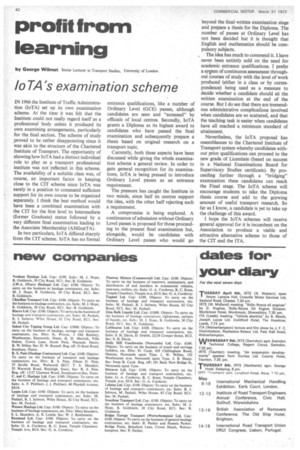profit from learning
Page 44

If you've noticed an error in this article please click here to report it so we can fix it.
by George Wilmot Senior Lecturer in Transport Studies, University of London.
loTA's examination scheme IN 1966 the Institute of Traffic Administration (IoTA) set up its own examination scheme. At the time it was felt that the Institute could not really regard itself as a professional body unless it produced its own examining arrangements, particularly for the final section. The scheme of study .proved to be rather disappointing since it was akin to the structure of the Chartered Institute of Transport. The opportunity of showing how IoTA had a distinct individual role to play as a transport professional institute was not 'reflected in this scheme. The availability of a suitable class was, of course, an important factor in keeping close to the CIT scheme since IoTA was rarely in a position to command sufficient support for its own course to be organized separately. I think the best method would have been a combined examination with the CIT for the first level to Intermediate (former Graduate) status followed by a very different final examination leading to the Associate Membership (AMInstTA).
In two particulars, IoTA differed sharply from the CIT scheme. IoTA has no formal entrance qualifications, like a number of Ordinary Level (GCE) passes, although candidates are seen and "screened" by officials of local centres. Secondly, IoTA grants a Diploma as its highest award to candidates who have passed the final examination and subsequently prepare a thesis based on original research on a transport topic.
Currently, both these aspects have been discussed while giving the whole examination scheme a general review. In order to gain general recognition for its examinations, IoTA is being pressed to introduce Ordinary Level passes as an entrance requirement.
The pressure has caught the Institute in two minds, since half its centres support the idea, with the other half rejecting such a requirement.
A compromise is being explored. A continuance of admission without Ordinary Level passes is proposed for those proceeding to the present final examination but, alongside, would be candidates with Ordinary Level passes who would go beyond the final written examination stage and prepare a thesis for the Diploma. The number of passes at Ordinary Level has not been decided but it is thought that English and mathematics should be compulsory subjects.
., The idea has much to commend it. I have never been entirely sold on the need for academic entrance qualifications. I prefer a system of continuous assessment throughout courses of study with the level of work produced (either in a class or by correspondence) being used as a measure to decide whether a candidate should sit the written examination at the end of the course. But I do see that there are tremendous administrative complications involved when candidates are so scattered, and that the teaching task is easier when candidates have all reached a minimum standard of attainment.
Nevertheless, the IoTA proposal has resemblances to the Chartered Institute of Transport system whereby candidates without prior qualifications can proceed to the new grade of Licentiate (based on success in a National Examinations Board for Supervisory Studies certificate). By proceeding further through a "bridging" examination these candidates can reach the Final stage. The IoTA scheme will encourage students to take the Diploma thesis course and add to the growing amount of useful transport research. So far as I know, a candidate is yet to take up the challenge of this award.
I hope the IoTA schemes will receive general approval for it is incumbent on the Association to produce a viable and attractive alternative scheme to those of the CIT and the ITA.




















































































